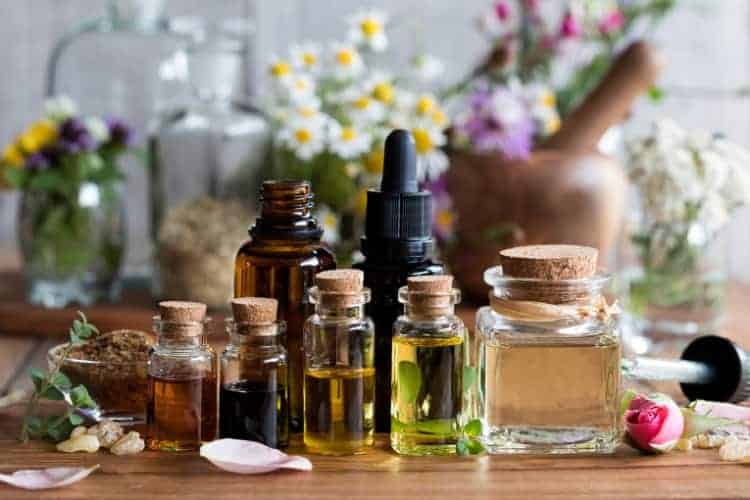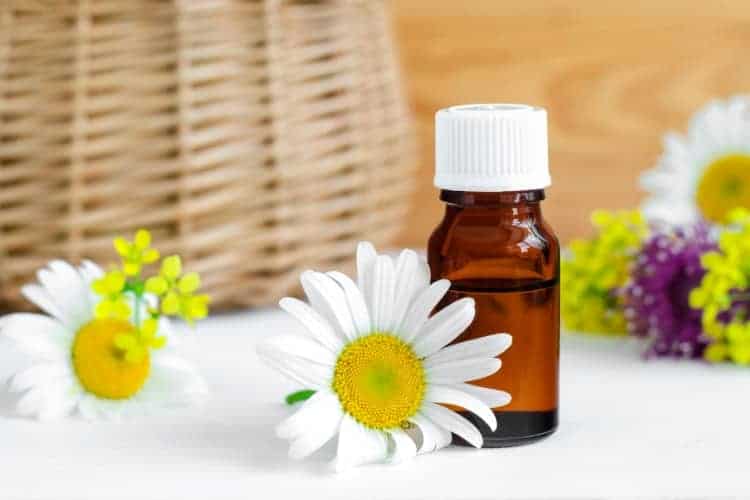
When it comes to facial care, essential oils can help with everything from acne and wrinkles to dark spots and eczema. However, since these oils are also very potent, the key to getting the right results is to master the art of essential oil dilution for face.
You see, diluting essential oils doesn’t reduce their potency.
On the contrary, dilution enhances your skin’s ability to absorb the oils, while simultaneously protecting you from common adverse effects (itching, redness, dryness and burns).
So, if you’re thinking about including essential oils in your natural facial care routine, then keep reading.
This post is going to show you how to safely use these oils on your face!
HOW TO DILUTE ESSENTIAL OILS FOR YOUR FACE
There are three main steps to follow whenever you’re making an essential oil blend for face application.
Step 1: Identify your goal + dilution ratio
In this step you’re simply deciding what you’re trying to achieve or what you’re trying to fix. For example:
- Smooth out wrinkles
- Reduce redness
- Get rid of acne
- Soothe itching or irritation
- Give your skin a healthy glow
- Balance moisture and sebum (i.e. your natural oil)
Regardless of what you’re trying to fix, please note that the safe dilution ratio for essential oils on the face is 0.2% to 1.5%.
If you’re not sure what that means, have no worries because I’ve included a chart further down to help you!
Step 2: Use Face-Friendly Essential Oils Only
Although there are several dozens of essential oils that work on the skin (i.e. face and body), only a few of them are actually safe for the delicate skin on your face.
And within that group of face-friendly oils, some are better for acne, while others work for scars, wrinkles and so on.
Furthermore, some oils come with multiple benefits, which means you can get the same result from one oil as you would from combining multiple.
Last but not least, some essential oils have a topical maximum or dermal maximum. This maximum simply refers to how much you can safely use on the skin.
Now, if you’re feeling confused about all this, don’t worry because in a few seconds we’ll go over the list of essential oils that are best for your face.
Step 3: Choose A Carrier Oil
A carrier oil has multiple purposes, including:
- Serving as the medium in which you dilute the essential oil (so that it doesn’t cause irritation).
- Aiding in the absorption of the essential oil.
- Providing additional nourishment and moisturization to your skin.
When choosing your carrier oil, make sure that it’s all-natural (or organic), cold pressed and free of added chemicals.
In addition, don’t feel like you have to get an exotic oil in order to get benefits.
Many “regular” oils that are used for cooking (like avocado and olive oil) are also excellent essential oils carriers.
And lastly, some carrier oils are better suited for specific types of skin (e.g. dry vs. normal vs sensitive and so on).
So, make your carrier oil selection based on the condition of your skin.
We’ll go over the specific carrier oils you can use shortly, so keep reading!
ESSENTIAL OIL DILUTION RATIO CHART FOR FACE APPLICATION
As we saw earlier, a 0.2% to 1.5% dilution ratio is safe for face use. To understand what this means, here’s a dilution chart for face that covers the safe dilution range.
| 15ml | 30ml | 60ml | |
| .2% | 1 drop | 2 drops | 4 drops |
| .5% | 2 drops | 4 drops | 9 drops |
| 1% | 4 drops | 9 drops | 18 drops |
| 1.5% | 6 drops | 13 drops | 27 drops |
Here are some tips to help you make sense of the chart:
- The numbers on the top row (such as 15ml and 30ml) represent the amount of carrier oil.
- If you like to think in terms of tablespoons, then 15ml = 1 tbsp, while 30ml = 2 tbsp.
ESSENTIAL OILS THAT ARE SAFE FOR THE FACE

Below is a list of my favorite essential oils for face that are easy-to-find and effective.
This list is by no means exhaustive! But it gives you a variety of oils to look out for, whether you make your own products or use store-bought.
1. Bergamot
- Antibacterial and anti-inflammatory, can help with painful cystic acne.
- Skin types: oily and acne prone skin
(source)
2. Carrot Seed
- Antibacterial and anti-inflammatory.
- Rich in antioxidants that help maintain healthy skin.
- Helps with wrinkles and scars.
- Skin types: normal, mature, dry and oily
(source)
3. Clary Sage
- Antibacterial properties.
- Helps with wrinkles and dark spots.
- Skin types: mature, dry and acne-prone.
(source)
4. Chamomile (German and Roman)
- Helps with eczema, wound healing and rashes, soothes
- Wrinkles, dark spots
- Skin types: all
(source)
5. Frankincense
- Natural anti-inflammatory and anti-bacterial
- Helps with wrinkles, stretch marks, scars and dark spots
- Skin types: normal, mature, dry and oily
(source)
6. Geranium
- Soothes inflammatory skin conditions like acne and dermatitis.
- Useful for wrinkles, scars and dark spots
- Skin types: normal, mature, dry, oily and sensitive skin
(source)
7. Juniper Berry
- Antiseptic and antibacterial.
- Soothes eczema and rashes.
- Helps to smooth out wrinkles.
- Skin types: mature, oily and acne-prone
(source)
8. Lavender
- Antibacterial and anti-inflammatory
- Rich in antioxidants that protect the skin from daily stress.
- Helps with wrinkles, scars and dark spots
- Skin types: all
(source)
9. Lemon
- Fights bacteria and skin inflammation
- Contains antioxidants that brighten the skin and balances skin tone.
- Improves acne, wrinkles and supports wound healing
- Skin types: normal, oily and acne prone *
(source)
10. Mandarin
- Improves wrinkles, acne, scars, dark spots
- Balances oily skin
- Gives skin a natural glow
- Skin types: normal, oily
(source)
11. Sweet Orange
- Fights bacteria and contains antioxidants that protect skin from free radical damage.
- Helps with wrinkles and acne
- Skin types: mature, oily
11. Rosemary
- Improves acne, improves circulation (which makes skin naturally radiant)
- Acts as a natural astringent and helps to tighten skin.
- Reduces puffy eyes and helps with wrinkles
- Skin types: acne-prone
(source)
12. Sandalwood
- Soothes dry, parched skin.
- Promotes cell renewal
- Has a mild astringent effect that helps to tighten pores
- Contains antioxidants that are helpful for wrinkles and other signs of aging
- Skin types: mature, dry
13. Tea tree
- Antibacterial and anti-inflammatory
- Reduces redness and swelling
- Prevents and reduces acne scars
- Natural antiseptic properties help to reduce excessive oiliness
- Soothes irritation and dryness associated with dry skin
- Treats eczema more effectively than common treatments like zinc oxide
- Skin types: acne-prone
(source)
NOTE: bergamot, lemon, mandarin and orange are all citrus oils. Citrus oils increase sensitivity to UV rays. So, avoid going out into the sun or using a tanning bed when you’ve applied these oils because you can end up with serious damage. It’s best to use these oils in your night-time skin care routine.
2nd NOTE: Some oils, like ylang ylang, cinnamon and thyme, are considered too strong for the face (though they can be used on the body, within limits). For the full list of oils to avoid on the face please read this article on how to dilute essential oils for skin.
WHICH CARRIER OIL IS BEST FOR FACE?

Now it’s time to talk about the best carrier oils for your face. Just like with essential oils, there are plenty of carrier oils to choose from.
The list below gives you some of the most common (some may already be in your kitchen!) and least likely to irritate the skin.
Almond oil
- suitable for all skin types
- absorbs slowly and can leave a slight oily residue
Avocado oil
- works for all skin types
- absorbs slowly and can leave a slight oily residue
Grapeseed oil
- works for all skin types
- absorbs fast and leaves skin feeling smooth
Hemp oil
- great for dry skin, combination skin and mature skin
- moderate absorption rate
- leaves a smooth/silky feeling on skin
Jojoba oil
- all skin types
- moderate absorption rate
- leaves the skin feeling smooth
Olive oil
- suitable for all skin types
- slow to absorb
- can leave a slight oily residue
Sesame oil
- great for dry skin, combination skin and mature skin
- moderate absorption rate
- leaves the skin feeling smooth
ESSENTIAL OIL DILUTION FOR FACE SERUM
As far as skin care products go, serums have one specific purpose: to deliver a high concentration of healing ingredients.
Serums can have different intended benefits, though they’re most often used to reduce wrinkles and moisturize the skin.
Now, because serums are meant to be concentrated, you might be tempted to use high quantities of essential oils in them.
Don’t 🙂
When making your own essential oil serum, still stick to the safe dilution ratios for face.
Here are a few other tips to keep in mind when diluting essential oils for a face serum:
- This is the time to indulge and invest in some of those carrier oils that are not part of our everyday life. For example, evening primrose, rosehip and neem oil.
- Use a 1.5% dilution rate for serums.
- Even though citrus oils are great for brightening the skin, be careful not to overdose on them when making a serum. Use one citrus oil, at most, and complete your blend with oils like lavender, chamomile and carrot seed.
TIPS FOR DILUTING LEMON, LAVENDER AND FRANKINCENSE FOR FACE
Lemon, lavender and frankincense are 3 essential oils that provide a lot of versatility (and are also beginner-friendly).
When using them in an essential oil blend for your face, the basic diluting rules we’ve covered definitely apply.
In addition, if you want to make sure that your blend smells nice, then it’s worth knowing which oils go well with all three of these oils.
After all, part of the fun of using essential oils is that you can create a scent that you enjoy 🙂
So, here are some face-friendly oils that also happen to mix well with lemon, lavender and frankincense.
- Lemon oil: blends well with chamomile, frankincense, geranium, and sandalwood.
- Lavender oil: blends well with bergamot, clary sage, geranium, rosemary, lemon and sandalwood.
- Frankincense oil: blend clary sage, lemon, lavender, geranium and sandalwood.
FAQs ABOUT ESSENTIAL OIL DILUTION FOR FACE
Can you mix essential oil with water?
Since essential oils do not dissolve in water, you need a dispersing agent that will help you to mix essential oils into water. One product you can use is solubol, which you can add into bath water or a DIY essential oil spray.
CONCLUSION
Using essential oils on your face is a wonderful way to experience the luxurious skin care benefits that nature has to offer us!
Just remember that even though many essential oils smell very flowery and soft, they’re actually very potent.
So, go ahead and have fun with these oils. But just make sure to follow the safety tips provided in this article 🙂
You Might Also Enjoy:
Is Chamomile Oil Good For Acne?
How To Use Tea Tree Oil In Your Skin Care Routine (No More Blemishes!)
Additional references used in this article:
https://books.google.com/books/about/The_Complete_Book_of_Essential_Oils_and.html?id=aGfLOwZpiVoC
https://www.healthline.com/health/essential-oils-for-scars
https://www.byrdie.com/essential-oils-for-dark-spots


